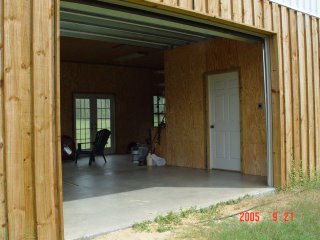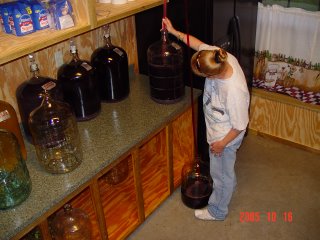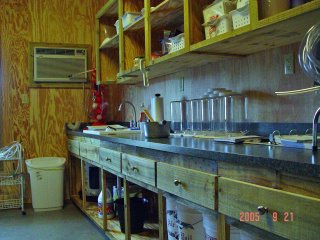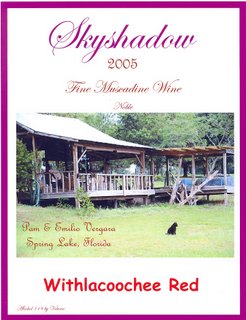Lessons learned, and not learned, about growing muscadine grapes and making wine in southwest Florida.
Sunday, May 21, 2006
Vitis rotundifolia Michx.
Tuesday, April 11, 2006
Let Consumers Pick Their Own Wine
By SENATOR PAULA DOCKERY
Apr 11, 2006
Florida consumers who want to purchase wines directly from wineries are being pitted against wholesalers, who want all such purchases to flow through them.
The state announced earlier this year that it will permit out-of-state wineries to ship their products to adult consumers, in accordance with federal court rulings that struck down state laws such as Florida's that ban direct shipments.
The Legislature is working now on implementing legislation to determine how direct shipment should be regulated.
One form of the legislation proposes a cap that would ban wineries that produce 250,000 gallons or more, as well as smaller wineries that they own or distribute for, from shipping to Florida. Such a cap would deny consumers the very access the courts upheld.
Some proponents will lead you to believe that this cap helps smaller wineries. But the only way that most small wineries can survive is to diversify the way in which they sell their wine. Direct shipment enables them to expand to new markets.
And the Federal Trade Commission has concluded that direct shipment gives consumers the freedom to buy wines at significantly lower prices, saving as much as 21 percent.
Lower prices, more choices - sounds good, right?
My bill, SB 282, is pro-consumer in that it gives Floridians increased choice in buying directly from any winery. Floridians just want to be able to buy wines from any of the 3,500 U.S. wineries they choose - it's truly as simple as that.
A cap in any form is discriminatory and works against consumer choice, fair trade and the spirit and intent behind the court rulings.
Sunday, February 26, 2006
Where we make the wine

Our wine room is inside the barn where I have my shop.

The racking process.

This is where we test for sugar and alcohol content, and keep everything sterile. The 12' by 18' room has 6 inches of insulation which allows the small air conditioner in the wall to keep it at a constant temperature. Where we keep it is a "family" secret.
The fermenting process.
This year, we experimented with a process that allowed us to not use any sulphites or preservatives. Don't know how long the wine will last in storage but it won a silver medal at the Florida State Fair amateur wine competition.
Withlacoochee Red

This year we entered seven wines in the Florida State Fair International Wine and Grape Juice competition, Amateur Division. To our surprise we won 6 medals, two silvers for a Carlos wine we called Spring Carlos and a Welder we called Dry Welder. Maybe seasoned winemakers can claim to be droll about such honors but for us it was a wonderful thing. We immediately celebrated by opening one of the silver medal winners and toasting the internet for making what little knowledge we've gained about this amazing process possible.
This label was created for a Noble red wine that we decided needed a little help beyond the fermentation process. It was just too weak, 10% alcohol, and tasted a lot like plain grape juice. No character. So, we designed a label to give it the visual character it lacked in taste. It just wanted to be called Withlacoochee Red because the grapes were grown in the Withlacooche River Basin, and since the Green Swamp, from where the river flows, is filled with stories about the truly strange characters who lived there, it could not go without a story about a man called "Withlacoochee Red". Here's his story which we printed on an additional lable on the back of the bottle:
- The legendary Withlacoochee Red had a beard down to his waist that was as red as a winter sunset. He was an Irish immigrant who lived as a mysterious recluse in the Green Swamp with his cat, Jawbone, until his mule died in 1929 from snake bite. He disappeared after that leaving only a shed full of Red Muscadine Wine that was rumored to have the ability to make weak man strong, a dull girl bright, and a dog able to smell a possum a mile away. This bottle, a fine muscadine rendition of Withlacoochee Red's secret formula, holds no such qualities except for the delicate aroma and taste only grapes grown in the Withlacoochee River Valley can claim.
It didn't help the taste but it sure made it easier to give it away to our friends.
Sunday, February 12, 2006
FGGA Annual Meeting
The Florida Gape Growers Association held its annual meeting last month in Ocala at the very-accommodating Hilton Hotel. It was a swell event with great subjects covered by some very knowledgeable people. Unfortunately, every time I’m exposed to an opportunity to learn more about the business of muscadine grape growing and wine making, I realize just how much I don’t know.
One thing I learned, nonetheless, was how much research is going on by the Florida Viticulture Center in Tallahassee and the University of Florida’s Institute of Food and Agricultural Sciences. Both are playing a huge role in developing a muscadine grape varietal that will make world class wine and withstand the rigors or Florida’s hot and humid climate.
It was very apparent, however, that funding for such programs is highly competitive, i.e., difficult to come by, and needs our support. Support can be given by writing, emailing or calling your local state legislator every time you hear about an issue that affects us. Maybe our local FGGA chapters can develop an “issue alert” for us and give us a rallying cry when our mutual interests are about to be impacted. Keeping a list handy of the names and email addresses of your particular legislators is a good idea. You can easily find such information on the internet under: http://myflorida.com/portal/Government or http://www.myfloridahouse.gov/ or http://www.flsenate.gov/
It was obvious that a lot of work went into organizing the annual event. Clearly, Frank Ascolillo and his wife worked some very long hours planning and preparing for it. They certainly have my congratulations for a very successful and meaningful learning experience.
There were several discussions that were of particular interest to me:
There is a new software program developed by Bonniejean and Bob Paulish that will help wineries meet new federal product tracking and reporting requirements. I have dreams of opening a small winery one day and had no idea that the issue of Homeland Security will have such an impact on its operation. If you haven’t heard about the new cradle-to-grave reporting requirements, it’s a blessing, unless you want to sell your wine. You can reach Bob or Bonniejean at 813-633-8692. Bob's email is bob.paulish@att.net.
Dr. Charles Sims is the man to call if you run into problems with your wine making. He seemed to know all there is to know about the chemical end of the process which, to me, is both amazing and maddeningly delicate. Only slight variations in the multiple steps it takes to make a decent wine can make it very “indecent” in a heartbeat. Dr. Sims can be reached via email at casims@ifas.ufl.edu and by phone at 352 392-1991 x 202. He’s a scientist with IFAS at the University of Florida.
For those of us looking forward to attempting to open a winery, Frank Ascolillo gave a very enlightening talk on the traps and pitfalls of the federal and state licensing processes. Apparently not a venture for the faint of heart. He pointed out that while there are folks who want to help you, it can be a frustrating experience. If you have an interest in this area, Frank can be reached at fascolillo@atlantic.net or 352-249-9116 … and good luck.
There were many other topics on the agenda that once again reinforced the fact that, in this business, for every cup of knowledge gained there are buckets more you need to know … and if you want to know more about what was presented at the conference, Bob Paulish announced that a CD of all presentations will be available from the FGGA soon.
